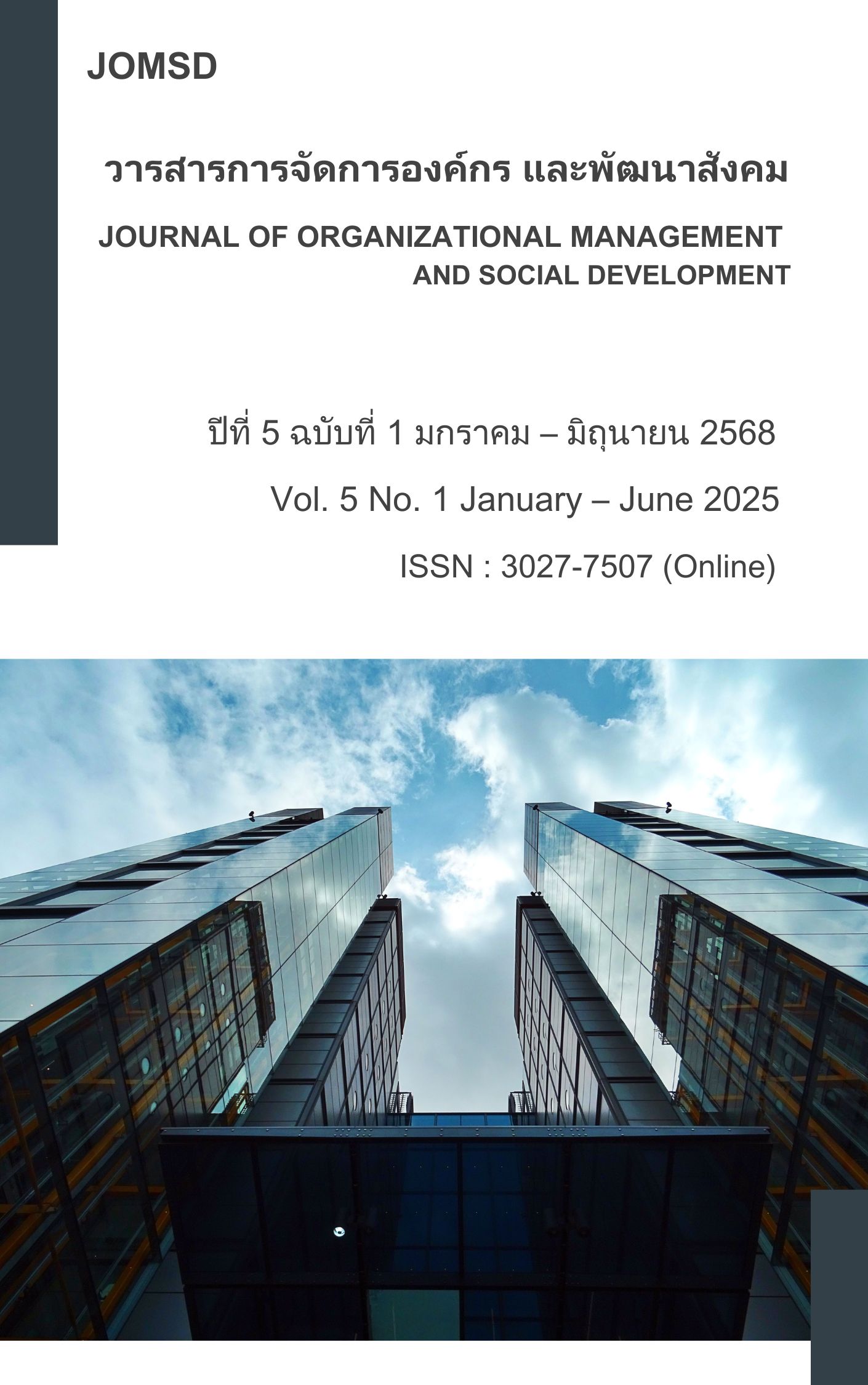Learning Model to Create Conscious Mind Being a Citizenship of Youth in Pattani Province
Main Article Content
Abstract
This research article aims to: 1) examine the current problems in learning management for fostering civic consciousness among youth in Pattani Province, 2) explore effective approaches to learning management that promote civic consciousness, and 3) develop a suitable learning management model to instill civic values among youth in the province. This study employed a qualitative research methodology, with a case study approach. The target group consisted of 40 participants, including school administrators, teachers responsible for civic education, and parents of students from nine secondary schools under the Pattani Secondary Educational Service Area Office. The research instruments included semi-structured interviews, focus group discussions were conducted. Data were analyzed through content analysis and synthesized into key themes based on the research objectives. The findings revealed that: 1) youth in Pattani face several challenges, including a lack of social interaction skills, excessive engagement with digital technology, and a shortage of creative spaces for personal development and learning; 2) effective learning management should continuously utilize community-based approaches and promote collaboration among all sectors, including the development of creative and inclusive learning spaces for youth; and 3) the development of a civic education model should adhere to the principles of multiculturalism, nonviolence, and human rights. Activities grounded in real-life situations and local contexts enhance students’ awareness of their responsibilities as “good citizens.” Teachers should act as facilitators rather than mere instructors, integrating school curricula with community-based initiatives and developing learning tools that emphasize life skills, democracy, and moral values.
Article Details
References
กัลยาณี ทศพรทรงชัย และสมพงษ์ จิตระดับ. (2566). ผลของการใช้แนวคิดชุมชนแห่งการสืบเสาะทางปรัชญาร่วมกับวิธีสอนแบบอภิปราย เพื่อส่งเสริมความตระหนักรู้เรื่องความเป็นพลเมืองของนักเรียนชั้นประถมศึกษาปีที่ 5. วารสารสังคมศาสตร์ปัญญาพัฒน์, 5(3), 349-364.
จรัส สุวรรณมาลา. (2562). การมีส่วนร่วมของชุมชนในการพัฒนาการศึกษา. กรุงเทพฯ: สำนักงานกองทุนสนับสนุนการวิจัย.
ทิพย์พาพร ปัญญาแก้ว. (2555). การเสริมสร้างจิตสำนึกพลเมืองในเยาวชนไทย. กรุงเทพฯ: จุฬาลงกรณ์มหาวิทยาลัย.
นฤมล บุญสนอง. (2561). การมีส่วนร่วมของชุมชนในการพัฒนารูปแบบการเรียนรู้เพื่อสร้างจิตสำนึกพลเมืองในพื้นที่จังหวัดชายแดนภาคใต้. ปัตตานี: สำนักงานเขตพื้นที่การศึกษาประถมศึกษาปัตตานี เขต 1.
นิรมล ตู้จินดา. (2557). แนวทางการพัฒนาหลักสูตรพลเมืองศึกษาในประเทศไทย. วารสารวิชาการศึกษาศาสตร์, 22(2), 35–47.
ปุญญิศา เขม้นงาน, ศุภพัชร์พิมล สิมลี และศรีรัฐ โกวงศ์. (2567). มหาวิทยาลัยกับการส่งเสริมความเป็นพลเมืองโลก: กรณีศึกษาโครงการเสริมสร้างศักยภาพนิสิตมหาวิทยาลัยเกษตรศาสตร์สู่สากล. วารสารสังคมศาสตร์ปัญญาพัฒน์, 6(4), 493-504.
พระครูปภัสสรกิตติคุณ ชุมโคตร และวิทยา ทองดี. (2568). แนวทางการสอนศาสนาเพื่อเสริมสร้างความเป็นพลเมืองโลก: บทเรียนสำคัญของครูสังคมศึกษา. วารสารสังคมศาสตร์ปัญญาพัฒน์, 7(1), 535-546.
เลิศพร อุดมพงษ์. (2562). พลเมืองศึกษา: รากฐานของการเมืองในระบอบประชาธิปไตย. วารสารรัฐศาสตร์ปริทรรศน์, 41(3), 1–18.
วสันต์ สาระสุข. (2560). แนวทางการจัดการเรียนรู้ที่เชื่อมโยงกับบริบทท้องถิ่นในโรงเรียนพื้นที่ชายแดนภาคใต้. ยะลา: มหาวิทยาลัยราชภัฏยะลา.
ศูนย์เฝ้าระวังสถานการณ์ภาคใต้. (2562). รายงานประจำปี 2562: ความรุนแรงและการเปลี่ยนแปลงทางสังคมในพื้นที่จังหวัดชายแดนภาคใต้. ปัตตานี: ศว.ภาคใต้.
ศูนย์อำนวยการบริหารจังหวัดชายแดนภาคใต้. (2565). รายงานสถานการณ์จังหวัดชายแดนภาคใต้: ด้านการศึกษาและการพัฒนาเยาวชน. ยะลา: ศอ.บต.
สำนักงานคณะกรรมการพัฒนาการเศรษฐกิจและสังคมแห่งชาติ. (2560). แผนพัฒนาเศรษฐกิจและสังคมแห่งชาติ ฉบับที่ 12 (พ.ศ. 2560–2564). กรุงเทพฯ: สำนักงานคณะกรรมการพัฒนาการเศรษฐกิจและสังคมแห่งชาติ.
สำนักงานเลขาธิการสภาการศึกษา. (2562). แนวทางการจัดการเรียนรู้เพื่อสร้างพลเมืองที่เข้มแข็งในสังคมพหุวัฒนธรรม. กรุงเทพฯ: สำนักงานเลขาธิการสภาการศึกษา.
สำนักงานเลขาธิการสภาการศึกษา. (2562). พระราชบัญญัติการศึกษาแห่งชาติ พ.ศ. 2542 และที่แก้ไขเพิ่มเติม (ฉบับที่ 4) พ.ศ. 2562. กรุงเทพฯ: กระทรวงศึกษาธิการ.
สำนักงานเลขาธิการสภาการศึกษา. (2563). รายงานการวิจัยเรื่อง การพัฒนารูปแบบการเรียนรู้เพื่อสร้างจิตสำนึกความเป็นพลเมืองในศตวรรษที่ 21. กรุงเทพฯ: สำนักงานเลขาธิการสภาการศึกษา.
สุวิทย์ วิบูลผลประเสริฐ. (2560). การส่งเสริมการมีส่วนร่วมของเยาวชนในพื้นที่จังหวัดชายแดนภาคใต้. วารสารสันติศึกษา, 5(1), 75–92.
อิสมาแอ หะยีอาแว. (2561). พฤติกรรมการใช้สื่อออนไลน์ของเยาวชนในพื้นที่ชายแดนภาคใต้: ปัญหาและแนวทางส่งเสริมการรู้เท่าทันสื่อ. ปัตตานี: มหาวิทยาลัยสงขลานครินทร์.
Banks, J. A. (2008). Diversity, group identity, and citizenship education in a global age. Educational Researcher, 37(3), 129–139.
Bryk, A. S., Gomez, L. M., Grunow, A., & LeMahieu, P. G. (2010). Learning to improve: How America’s schools can get better at getting better. Massachusetts: Harvard Education Press.
Freire, P. (1970). Pedagogy of the Oppressed. New York: Herder & Herder.
Kolb, D. A. (1984). Experiential learning: Experience as the source of learning and development. Englewood Cliffs, NJ: Prentice Hall.
OECD. (2018). Preparing Our Youth for an Inclusive and Sustainable World: The OECD PISA Global Competence Framework. Paris: OECD Publishing.
Ribble, M. (2012). Digital citizenship in schools: Nine elements all students should know. (3rd ed.). Eugene, OR: International Society for Technology in Education.
Thomas, J. W. (2000). A review of research on project-based learning. San Rafael, CA: The Autodesk Foundation.
UNESCO. (2015). Global citizenship education: Topics and learning objectives. Paris: UNESCO Publishing.

